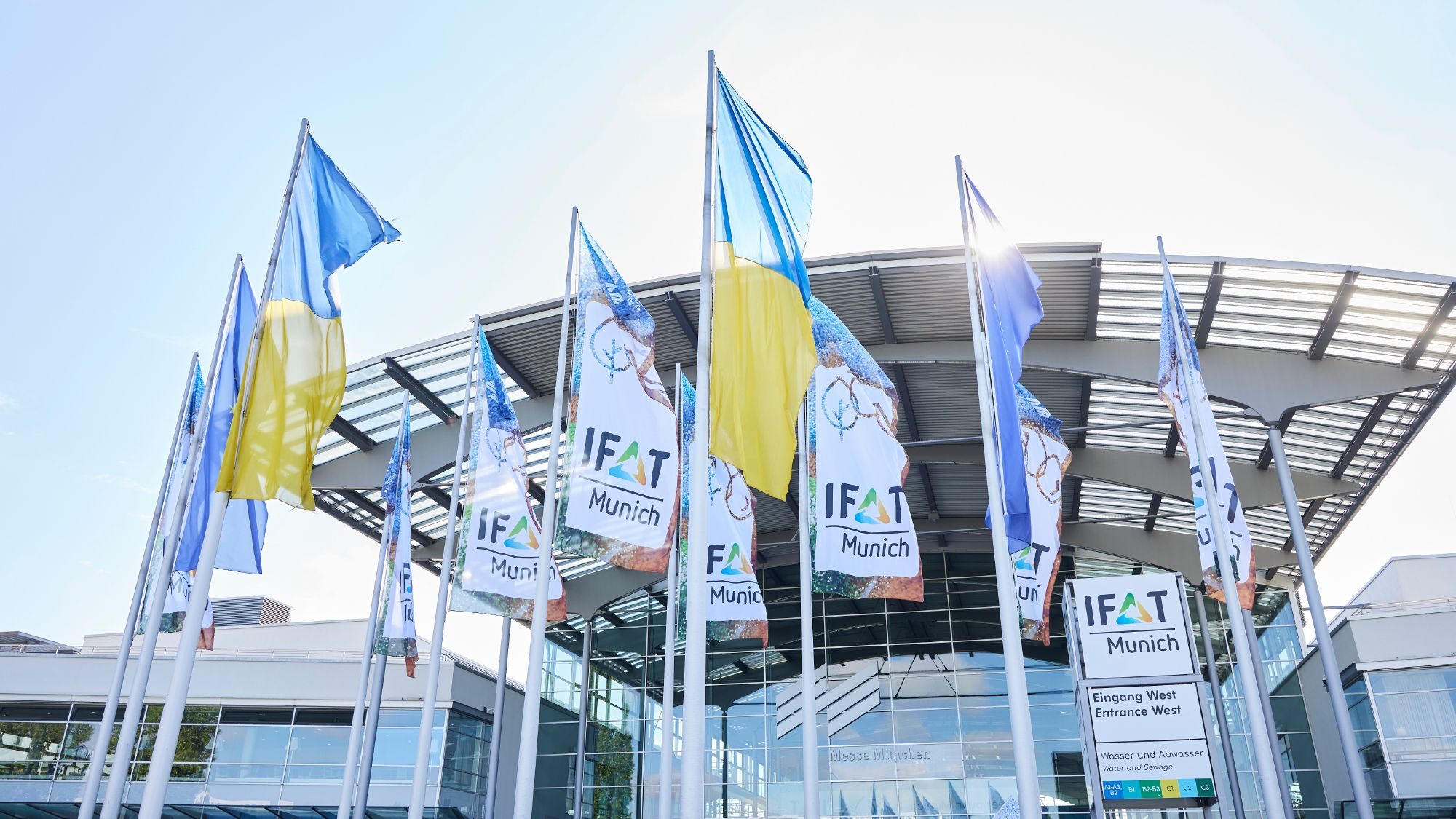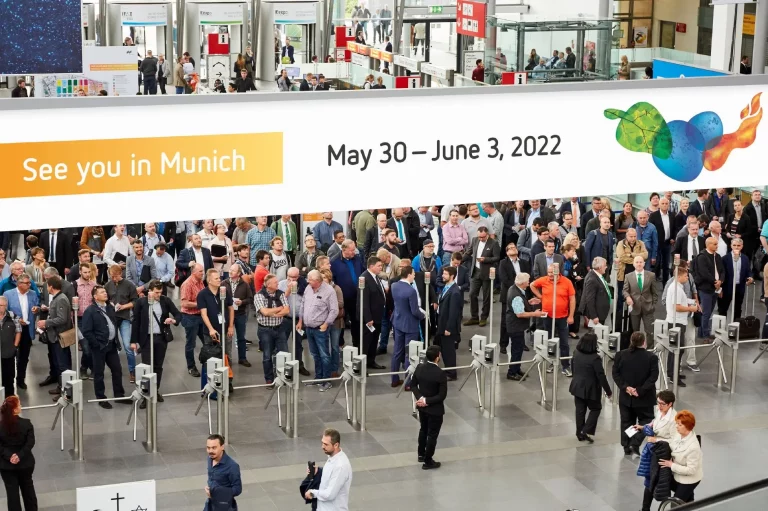IFAT 2022 in Munich

Water-conscious cities were the focus of this years IFAT.
IFAT 2022, the world’s leading trade fair for water, sewage, waste, and raw materials management took place in Munich from 30 May to 3 June 2022. The core theme of the 2022 trade fair was Water-conscious cities. We have summarised what you need to know about IFAT here.
More than 2,500 exhibitors from 50 countries had registered for this year’s IFAT trade fair in Munich. The trade fair took place from May 30 to June 3, 2022, at the Munich exhibition centre and will revolve around the sustainable use of resources. The world’s leading trade fair for water, sewage, waste, and raw materials management attracted a lot of interest because it presented future-proof environmental technologies for climate protection.
IFAT 2022: Water-conscious cities
All 18 exhibition halls and a large part of the outdoor area were occupied. There were 2984 exhbitors and 119,000 visitors came to visit the trade fair. Compared to the record-breaking 2018 trade fair, this was a very strong development – despite the pandemic. According to Stefan Rummel, Managing Director of Messe München, the team constantly received new inquiries.
IFAT 2022 focussed on the urgency of environmental, resource and climate protection. The latest IPCC Assessment Report highlights these issues among others. In this context, water was a key focus of the trade fair this year. Water-conscious cities and technologies will set new standards.
Skyscrapper
Halfpage
Billboard
Skyscrapper
Halfpage
Large companies and start-ups dominated IFAT 2022
IFAT aims to bring together international decision-makers, experts, and market players in one place to tackle major challenges together. With major international events such as IAA MOBILITY, Messe München has succeeded in this in recent years, even under more difficult conditions. The more relaxed Corona conditions in spring 2022 further facilitated networking.
In the “Recycling and Waste Management” sector, suppliers such as Remondis, Veolia, PreZero, EEW Energy from Waste, Doppstadt Umwelttechnik, Komptech, Arjes, Sutco RecyclingTechnik, Eggersmann, Lindner-Recyclingtech, Zeppelin Baumaschinen, Sennebogen Maschinenfabrik, Liebherr-Hydraulikbagger, Komatsu, Zöller-Kipper, Martin, SSI Schäfer and ESE were exhibitors at the 2022 IFAT.
For “Water and Wastewater”, Wilo, Huber, Invent Umwelt- und Verfahrenstechnik, Grundfos, KSB, Sulzer, Xylem Europe, Endress+Hauser, Gea Westfalia Seperator Group, Kaeser Kompressoren, EnviroChemie, Otto Graf, Aerzener Maschinenfabrik, Veolia Water Technologies, AVK Armaturen, Hawle Armaturen, Talis, Siemens, Hermann Sewerin, Aco Tiefbau, Kaiser and IBAK, among others, attended the trade fair.
“Municipal Technology” was represented by Faun Umwelttechnik, Bucher Municipal, Aebi Schmidt, Küpper-Weisser and Fayat Environmental Solutions, while vehicles included Iveco Magirus, Scania, Volvo Group Trucks, DAF Trucks, Daimler Truck and Mercedes Benz at IFAT 2022.
Numerous international exhibitors as well as start-ups were also at the show.
Solutions for water scarcity at IFAT Munich
Water scarcity is a major challenge for companies working in water and wastewater management. For other companies, too, the sustainable use of existing resources, especially scarce water, is a key issue for the future.
German industry reduced water consumption already for three decades. This trend must continue, because increasing periods of drought in many regions can lead to difficulties even in water-rich Germany. Conflicts over use are already emerging in countries such as Turkey, Syria, Iraq, and Yemen.
Water-saving technologies that make even better use of rainwater or treated wastewater, for example, therefore generated particular interest at IFAT 2022 in Munich. The aim is to achieve completely wastewater-free production. This is already a reality in some places: An Audi plant in Mexico, for example, has been treating 100 percent of its wastewater since 2016 and using it as company water, in production, and for watering green areas.
The so-called “zero liquid discharge strategy” offers many fields of application. It can close the water cycle. Qatar, for example, treats saline wastewater with the help of solar panels so that the water can re-enter the cycle. In other countries, however, the water cycle is not the main problem, which is why other areas such as wastewater concentrates, and improved industrial water cycles are of interest here.
Water-conscious urban development as a task for the future
IFAT 2022 offered a platform to discuss the topic of water-conscious cities, challenges, and obstacles, but also solutions and best-practice examples. Many municipalities are facing either heavy rainfall or drought. In both cases, municipalities need a more water-conscious urban development.
The buzzword “sponge cities” came up frequently at IFAT 2022. This is an adaptation strategy: thanks to urban green zones, wetlands, water and flooding areas, and multifunctional storage spaces, sponge cities can absorb a lot of rainwater. This means that excess water does not have to be discharged directly into canals and receiving waters. This helps mitigate the effects of storms while storing water for subsequent dry periods. In combination with green roofs and facades, existing green spaces and trees can then help cool the city and improve its air quality.
Medium Rectangle
Halfpage
European pioneers for water-conscious cities
Asian cities such as Singapore and southern Chinese metropolises are already successful sponge cities. Now European cities are following suit: Copenhagen and Vienna are among the pioneers. In Copenhagen, water management has already been in place since 2014, with elements such as underground relief tunnels and irrigation of green spaces with water from sewage treatment plants.
In Vienna, a new district called Seestadt is currently being built on a former airfield. Here, generous, contiguous root spaces store rainwater and release it to the city’s trees over long periods of time. Seepage, filtration and settling basins, decentralised micro sewage treatment plants and salt-resistant perennials are other parts of the Austrian strategy.
In Germany, Hamburg is a prominent example of successful water management. New development areas almost completely separate stormwater from the sewer system. The city is also well prepared for floods and is working to minimise their risk.
Learn more about IFAT on their official website.
You might also be interested in this: Munich Architect wants to convert Nord Stream 2 into buildings














